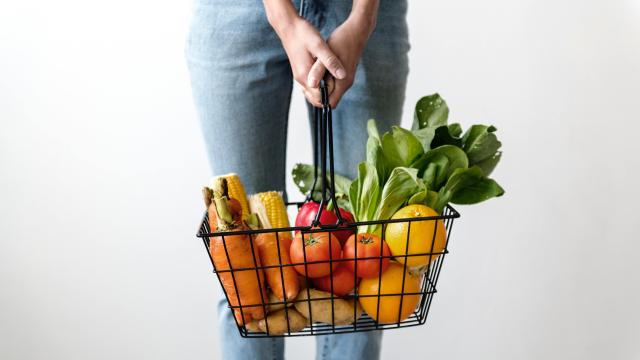With the rise of zero-waste grocery stores, it’s now easier than ever to reduce your environmental impact when shopping for food. But what exactly is “zero waste”, you ask?
Put simply, it’s about producing less byproduct (not necessarily zero — that’s just the goal). Think about all those plastic bags, all that packaging you end up with at the end of a shopping trip and inevitably throw out or recycle. That’s what zero-waste proponents are trying to reduce.
But can you zero-waste grocery shop at popular stores like Woolies? Yes! Though we’d call it “zero-ish” waste (sometimes you can’t forgo using every piece of plastic or paper at stores).
[referenced url=”https://www.lifehacker.com.au/2019/03/stop-recycling-plastic-bottles-without-caps-on/” thumb=”https://i.kinja-img.com/gawker-media/image/upload/t_ku-large/csmo9py2a20pgyr3ee0v.jpg” title=”Stop Recycling Plastic Bottles Without Caps On” excerpt=”With the recycling industry in flux, the rules surrounding recycling plastic aren’t always a given. For one, you can’t recycle plastic bags or straws and now black plastic is even becoming a problem. How will we ever know the right way to recycle?”]
By committing to reducing your impact, you can help cut down on the containers and packaging. Here’s everything you need to know about zero waste and how to minimise your own impact while grocery shopping.
Consider your consumption
Before you begin your quest, think about your own consumption and buying habits—zero waste isn’t a one-size-fits-all proposition.
“The first thing to do is just to look at your own trash bag,” Katherina Bogatireva, owner of Precycle, a zero-waste grocery store in Brooklyn, said by phone. “That’s the only way to know what to avoid and what to replace. It’s an individual thing. The solution is not to wake up one day and say, ‘I’m going to go zero waste,’ toss everything I have out, and replace [it] with stainless steel or glass containers. That’s not the best thing to do, it’s actually quite the opposite.”
Instead, simply understand where you’re most wasteful. For instance, if you have a lot of plastic lying around after a shopping trip, zero-waste shopping is where you can help offset it, by reusing those plastic bags or packaging or buying unsealed products as often as possible.
Buy in bulk
One of the key components of zero-waste shopping is buying in bulk. No, that doesn’t mean buying so much toilet paper that it will line your closets and garage. It means buying food that’s commonly sold in scoopable containers with no packaging.
You can find necessities like sugar, vinegar, nuts, rice, granola, and oats in bulk departments. Fancier stores may have aisles of bulk soaps, spices, or pet food, too. How does this help reduce your impact? You’re reducing a great deal of packaging you and the store would otherwise use (and furthermore, you can choose the exact amount of product you want without food going bad because you couldn’t finish it).
Bring your own containers
Ideally, the point of zero waste is to reuse whenever possible, which means bringing your own containers to collect food. Yes, you can bring your own glass or plastic containers to most stores — if you want to be sure, visit any health food store.
Find a staff member who will weigh your containers before you put anything in them, so you can pay the right amount. (If you’re worried this will be awkward, let them know you’re trying to minimise your plastic consumption! And if you shop at a store often, they’ll get used to your requests after a few visits). Glass mason jars are a safe bet, as are cloth bags for produce and fruit, as Wild Minimalist recommends.
[referenced url=”https://www.lifehacker.com.au/2018/11/how-to-stop-using-so-much-disposable-plastic/” thumb=”https://i.kinja-img.com/gawker-media/image/upload/t_ku-large/nnspceqpr0klzeltspin.jpg” title=”How To Stop Using So Much Disposable Plastic” excerpt=”We are drowning the world in plastic. It washes onto our beaches, it sits entombed for centuries in landfills, it floats around the ocean in a cloud of microscopic particles twice the size of Texas. Most of it — 88% in Australia — never gets recycled.
Recycling it still takes 10% of the energy of making new plastic — not nothing. It would be nice to use a little less in the first place.”]
Shopping for cheese, bread, meat? Provide the person behind the counter with your container. In the case of cheese, they may be able to provide you with a wedge without cellophane wrap. Many bakery sections of grocery stores have unsealed bread in the back, too.
And of course, bring a reusable bag along with you to carry it all. Keep an extra bag in your car or backpack so you’re never without.
Visit farmers’ markets
If all else fails, there are a number of things you can do to minimise your impact outside of popular grocery stores. Bogatireva recommended farmers’ markets, which allow you to buy and support local farmers and often permit you to buy products without unnecessary packaging.
And if bulk products aren’t available at your grocery store, buy the biggest possible packages for things that aren’t perishable, she added — think rice or granola or something you eat often. You’ll reduce packaging and save yourself from a couple of trips to the store, too.
If you want to get even more serious about reducing your impact, try composting with our handy guide. And if that seems a little ambitious, do the next best thing and search online for a nearby compost drop-off site.

Comments